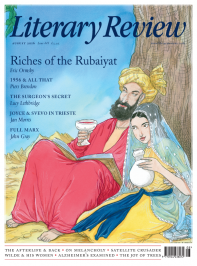Megan Nolan
Excavating Passions
The Bones of Grace
By Tahmima Anam
Canongate 411pp £14.99
I read the most engaging part of this sprawling, delicate novel in an excerpt in Granta in 2013. Tahmima Anam had been included in that magazine’s ‘Best of Young British Novelists’ list. ‘Anwar Gets Everything’ told the story of a Bangladeshi worker forced to wash skyscraper windows without safety equipment. Anwar’s tale turns out to be just one element of The Bones of Grace, which completes a trilogy that began with 2007’s much-feted A Golden Age and continued with The Good Muslim in 2011. Those books were characterised by an intense personal engagement with the consequences and aftermath of the Bangladeshi Liberation War of 1971. They were brought to life both by Anam’s use of her family history (her parents were freedom fighters whose tales make their way into the novels) and by a vast research project (Anam interviewed hundreds of people as part of her PhD at Harvard).
The Bones of Grace moves away from that era; although the war is a presence in the book, it’s not the driving concern. Set in the present day, it is narrated largely by Zubaida, a marine palaeontologist from Dhaka, in the form of a long letter to Elijah, her lover,

Sign Up to our newsletter
Receive free articles, highlights from the archive, news, details of prizes, and much more.@Lit_Review
Follow Literary Review on Twitter
Twitter Feed
It wasn’t until 1825 that Pepys’s diary became available for the first time. How it was eventually decrypted and published is a story of subterfuge and duplicity.
Kate Loveman tells the tale.
Kate Loveman - Publishing Pepys
Kate Loveman: Publishing Pepys
literaryreview.co.uk
Arthur Christopher Benson was a pillar of the Edwardian establishment. He was supremely well connected. As his newly published diaries reveal, he was also riotously indiscreet.
Piers Brendon compares Benson’s journals to others from the 20th century.
Piers Brendon - Land of Dopes & Tories
Piers Brendon: Land of Dopes & Tories - The Benson Diaries: Selections from the Diary of Arthur Christopher Benson by Eamon Duffy & Ronald Hyam (edd)
literaryreview.co.uk
Of the siblings Gwen and Augustus John, it is Augustus who has commanded most attention from collectors and connoisseurs.
Was he really the finer artist, asks Tanya Harrod, or is it time Gwen emerged from her brother’s shadow?
Tanya Harrod - Cut from the Same Canvas
Tanya Harrod: Cut from the Same Canvas - Artists, Siblings, Visionaries: The Lives and Loves of Gwen and Augustus John by Judith Mackrell
literaryreview.co.uk